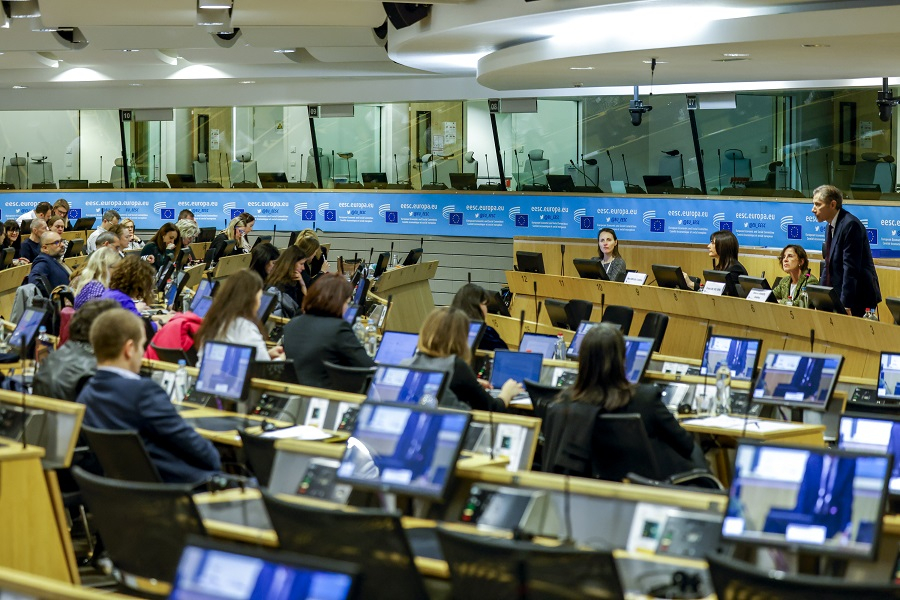More flexible, and even tailored, pathways to upskilling and lifelong learning can be one way of reaching people with low skills, from poorer backgrounds and others at risk of social exclusion. Gender imbalances in labour markets still require attention.
Cedefop and the European Economic and Social Committee (EESC) held their 5th Policy learning forum on upskilling pathways on 6 and 7 February, in Brussels. The forums allow countries to learn from one another and explore ways to improve upskilling, reskilling and lifelong skills development, including training for low-skilled adults in Europe.
The first day was dedicated to the challenges of providing upskilling pathways for adults with low qualifications. ‘Promoting upskilling pathways for all adults by no means implies that low-skilled adults no longer deserve our attention – on the contrary. But targeting exclusively the low-skilled is simply not enough, as this would risk overlooking the broader implications of the technological evolution for the entire workforce,’ said Cedefop Deputy Director Mara Brugia.
‘Another concern is the gender segregation of labour markets, which contributes to difficulties filling new vacancies in the face of growing demand. Male-dominated activities, ICT professional services, civil engineering, transport and construction occupations, could benefit from an expanded labour supply pool if more women could access relevant training and jobs. On the other hand, women are over-represented in healthcare, residential care and social work, where work is often undervalued and opportunities for retraining and upskilling are very weak,’ said Cinzia Del Rio, President of the EESC’s Section for Employment, Social Affairs and Citizenship.
The discussions were based on the conclusions of the Cedefop thematic country reviews of France and Italy and some preliminary indications from the ongoing review in Croatia. For France, the solutions that emerged most strongly during the roundtable debates included: encouraging approaches to 'reach out' to low-skilled adults (unemployed or employed) and enable them to express their desire to undertake an upskilling pathway; incentivising enterprises to participate in upskilling pathways to support less qualified people (employees and jobseekers); and ensuring 'multi-stakeholder governance' (national, regional and local authorities, partners) at the most appropriate territorial level.
For Italy, it was also about closing the gap between governance and delivery through streamlined multi-stakeholder governance at the most appropriate level, as well as about increasing the effectiveness of communication, including by informal social networks. The Croatian representatives also drew attention to flexible training for low-skilled adults.
The second day focused on learning-conducive work environments, social dialogue and employers' policies. As emphasised in the discussions, their approach needs to go beyond reaction or adaptation, but also to try to be proactive and anticipate change.
Therefore, in addition to studying megatrends, such as demographic change, it is necessary to look at trends, i.e. medium-term shifts and patterns that indicate future needs in terms of learning-conducive work environments. ‘Making workplaces more learning-conducive is critical to reinforcing skills in a shrinking labour force – furthermore, investment in building a learning-conducive environment pays off, increasing companies' profitability and helping them tap into new talent pools,’ said Cedefop Executive Director Jürgen Siebel.
According to Cedefop’s study, the trends with the highest degree of certainty of relevance (apart from the shrinking EU labour force) are that jobs will focus strongly on social and emotional skills, creativity, innovation, complex problem-solving and digital skills. This relates to the shift towards more human-centred skills less likely to be automated or replaced by machines. Other trends include an increasingly fragmented working life, an increasingly fast pace of change in jobs, a greater need for adaptability on the part of the working population, and an increasingly fluid and dynamic learning process.
Currently fewer than 1 in 5 companies, according to Cedefop’s studies, take advantage of boosting business performance through higher investment in skills development. This calls for improvements in numbers, while future challenges also require a ‘cultural shift from a fixed to a growth mindset’, which means ‘creating an environment where people feel encouraged, safe, learn to grow and develop their skills.’
Another of the dozen desirable features of learning-conducive work environments presented at the forum was personalised learning pathways, i.e. going beyond the ‘fit-for-all’ pattern of training and recognising informal learning. The importance of the Pact for Skills, launched by the European Commission in 2020, was also emphasised. Its aim is to get public and private organisations together and encourage them to make concrete commitments to upskilling and reskilling adults.
‘The process of lifelong learning is now the responsibility of employees themselves. However, it improves the quality of their work in terms of the productivity competitiveness of companies in the global market. Hence, companies also have a responsibility to plan and organise their activities in such a way as to provide training opportunities through collective agreements and the social dialogue. We need a forward-looking industrial strategy including skills policies that are truly effective because they involve everyone, workers and employers,’ said Carlos Trindade, President of the EESC’s Labour Market Observatory.

